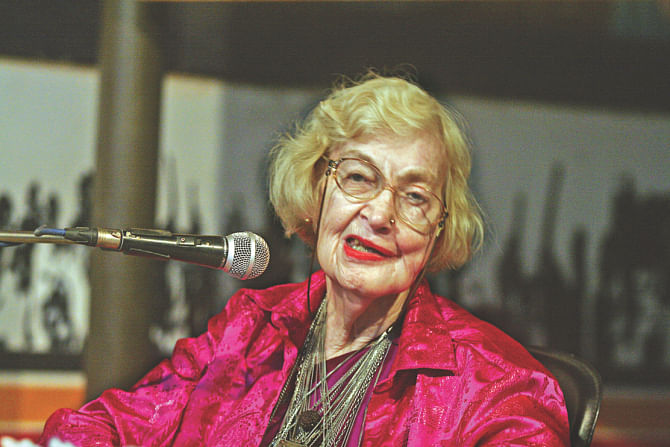Saving war babies
The Daily Star
Canadian couple took 15 from Bangladesh in ‘72 for adoption

On July 19, 1972, Bonnie Cappuccino accompanied 15 war babies on a special Air India flight from Dhaka's Tejgaon (old) airport to Canada.
Most of the babies were premature, born at seven to eight months, and so they were very fragile and weak, she said at the Liberation War Museum in the capital's Sengunbagicha yesterday before handing over the documents that had legalised their adoption by Canadian couples in the absence of bilateral adoption rules at the time.
She came here last week on her regular visit to Shishu Shorgo that she along with her husband Fred Cappuccino founded in 2002 in Chittagong. She visits the child home four times a year.
The Cappuccino couple represented Canadian philanthropic organisation "Friends for the Families in Canada" in 1972.
Having read about the Liberation War of Bangladesh and its aftermath in newspapers, they decided to try to save war babies, who were unwanted here given the social context of the newly emerged country.
"We heard that Mother Teresa's home [Missionaries of Charity at Islampur in Dhaka] had babies born as result of sexual violence against Bangalee women," Bonnie said while speaking of how the first international adoption of Bangladeshi war babies had taken place.
There were several premature babies at Teresa's Home and to keep them warm, the organisation made devices, a sort of incubator, with drawers and a lid on top. The majority of the 15 were taken from the shelter.
One of them was adopted by Bonnie herself. She, now aged 80, has another 18 adopted children from different countries and two of her own.
The adopted girl child from Bangladesh, Shikha, works at a government agency in Canada and is a proud mother of two daughters.
When reporters asked why she and her husband had picked Shikha among the 15 war babies, Bonnie chuckled and said, "She was the most beautiful baby."
"She [Shikha] never had the opportunity to visit Bangladesh. But I am sure she would like to come [here] someday."
Bonnie in 1973 worked to establish a child home in Dhaka to shelter war babies, orphans and destitute children. The couple's next mission was Shishu Shorgo, which shelters 69 children at present and provides education to more than 100 others.
Receiving the adoption documents, Mofidul Hoque, a trustee of the museum, said Bonnie and her husband had done a very difficult job.
"These documents symbolise the bond between the two nations and their citizens and remind us that law should not be a barrier to humanity."
Mofidul continued saying how the Bangladesh government's quick action and cooperation and the willingness of the Cappuccino family helped the war children find loving shelters.
As an expression of gratitude to them for beginning the inter-country adoption of war babies, he said the government should provide a piece of land in the port city to Shishu Shorgo that currently operates on a property lent by a local philanthropist.